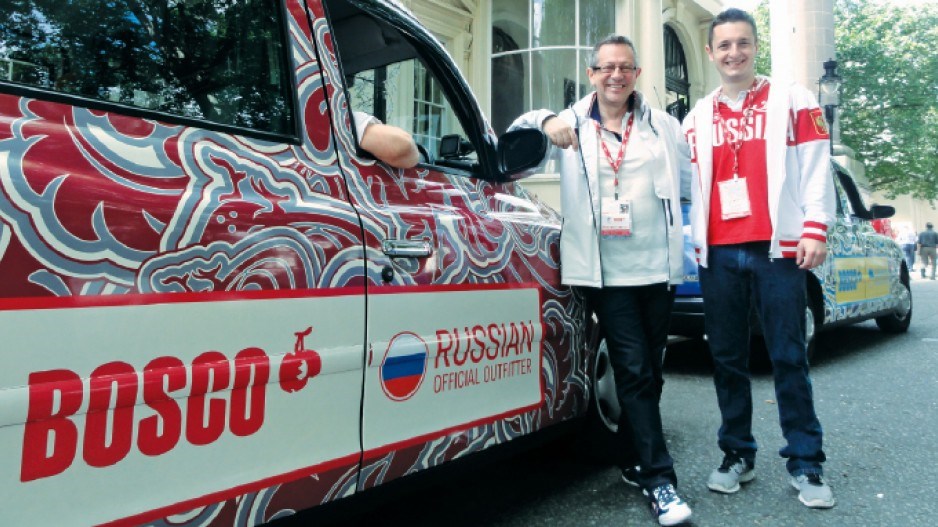LONDON: Arthur Griffiths relaxes in a lounge at the stately British Academy, across the Mall from the Olympic beach volleyball venue at Horse Guards Parade.
“Of everything we looked at, in fact of every venue I’ve looked at for other countries, we may have nailed the best location in London,” said Griffiths, former owner of the Vancouver Canucks and an early leader of Vancouver’s successful 2010 Winter Olympics bid.
Griffiths oversaw hospitality for Bosco, the expanding Russian sportswear company, outfitter of Russian, Ukrainian and Spanish Olympic teams at the London Olympics and an official sponsor of Sochi 2014. The company’s lavish, invitation-only, 40,000-square-foot venue included a clothing boutique, themed restaurants, a nightclub and a patio with live jazz.
Bosco-decorated taxicabs and double-decker buses waited outside to shuttle guests. Griffiths even arranged for a pop-up storefront at nearby British Columbia House, which was vacated for renovation by its landlord, the Crown Estate.
When Bosco executives turned their attention to Vancouver after the Beijing Games, they met and eventually hired Griffiths to run Bosco’s program for the 2010 Games. Satisfied owner Mikhail Kusnirovich invited Griffiths to visit Moscow, where he asked him to carry on the job for 2012 in London.
“Hockey seems to have brought me to Bosco, and Bosco has brought me to London as a result of maybe the Vancouver Olympics and a little bit of the hockey history,” Griffiths said. “It’s allowed me to move to another city. The energy, the adrenalin, the challenge, as well, of putting on an event like this in London, is massive yet fulfilling.”
Russians and the Olympics provided Griffiths with two of his career turning points.
Griffiths’ father Frank, an accountant who built a Western Canadian broadcast empire, bought the Canucks in 1974. As a 23-year-old in 1981, Griffiths became Frank’s assistant and progressed into the chairmanship of the club that acquired Russian stars Igor Larionov and Vladimir Krutov and drafted Pavel (“the Russian Rocket”) Bure in 1989.
Bure debuted in 1991, registered back-to-back 60-goal seasons and was a key element in the seven-game, 1994 Stanley Cup final against the eventual champion New York Rangers. He’ll be the Canucks’ first Hockey Hall of Fame inductee this fall.
Griffiths opened General Motors Place, Canada’s first privately financed arena since Maple Leaf Gardens, in 1995. The $163 million arena and the $125 million expansion fee for the National Basketball Association Vancouver Grizzlies were too much for him to bear alone. Seattle billionaire John McCaw assisted, then acquired the company in 1996.
Griffiths remained in the winter sports arena as chairman of the Vancouver Whistler 2010 Bid Committee, which got Canadian Olympic Committee endorsement in 1998. “The Summer Olympics are the Winter Olympics on steroids,” Griffiths said. “It seems to me in London every six weeks there’s a major event. The problem is that in London there is a resistance to an event taking over entirely, basically all of London east to west from Heathrow to Stratford has been taken over, and that’s where there’s been an issue with some of the public.”
But, Griffiths said, “the athletes suddenly diminish the criticism, as it were, and London has done a great job.”
Over at Trafalgar Square, Gordon Campbell, High Commissioner to the United Kingdom and Northern Ireland, held court in Canada House during the Games when it became Canada Olympic House for friends, family and sponsors of Canada’s Olympic team.
“The sign of a well-prepared Games is when they deal with uncertainty and things that they weren’t expecting,” said Campbell. “I think it will go down as one of the best Summer Games ever.”
The 64-year-old was appointed in summer 2011 by Prime Minister Stephen Harper to be Canada’s ambassador in time for the Diamond Jubilee and Olympic year. The most prestigious foreign service job Canada offers includes a residence at Grosvenor Square. Campbell hosted 20 business promotion events at Canada House during the Games, including visits by Alberta premier Alison Redford, B.C. Energy, Gambling and Liquor minister Rich Coleman and Vancouver mayor Gregor Robertson. His successor, Premier Christy Clark, did not accept an invitation.
“She’s got – every premier’s got – lots to do, and they have got to put that in priority,” Campbell said.
Campbell declined to comment on B.C. political issues, including Clark’s plummeting popularity and fresh questions about whether she had a role in the controversial, bribery-tainted privatization of BC Rail in 2003.
“This is what I’m really concentrating on: 12 medals in 2012 in London, that’s it. I wouldn’t comment,” he said, on the eve of the July 27 opening ceremony. “Frankly, I spend most of my time worrying about here, not about what’s going on in B.C.”
Campbell quit the premiership in early November 2010 under both caucus and public pressure over the harmonized sales tax. Coincidentally, Canada Olympic House included a temporary Hudson’s Bay Company Canadian Olympic souvenir store where the merchandise was in Canadian dollars and no sales tax was charged.




